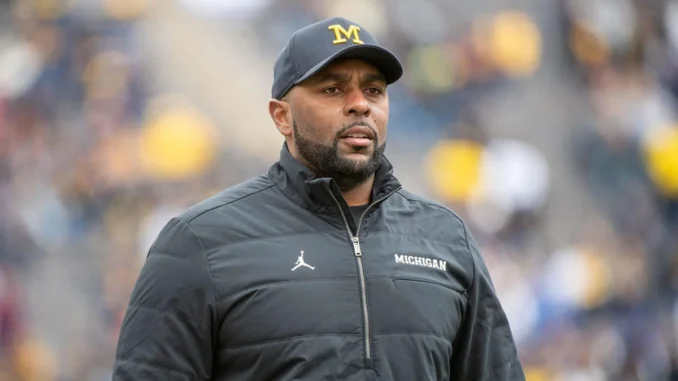
In a move that has sent shockwaves through college football, the University of Michigan announced today the dismissal of head football coach Sherrone Moore. The decision, which comes less than a year after Moore was officially named Jim Harbaugh’s full-time successor, follows weeks of mounting pressure, internal discontent, and a deteriorating team culture within the Wolverines’ program.
According to multiple sources within the athletic department, Moore’s dismissal was not solely performance-based, but rather the result of a combination of factors — including player unrest, staff disagreements, and administrative concerns about the future direction of the program.
Sherrone Moore’s ascent to the head coaching position was initially met with optimism and excitement in Ann Arbor. A longtime assistant under Jim Harbaugh, Moore had served as offensive coordinator and offensive line coach, playing a major role in Michigan’s physical identity and Big Ten championship success. His leadership during Harbaugh’s three-game suspension in 2023, which included a dramatic win over Penn State, earned him respect and credibility.
Following Harbaugh’s departure to the NFL’s Los Angeles Chargers, Moore was promoted to head coach with overwhelming support from players, alumni, and boosters. Expectations were sky-high — the Wolverines were coming off a national championship and were considered legitimate contenders for a repeat run.
However, things began to unravel quickly
According to insiders, Moore’s transition to the top job was marred by growing pains and clashes with both veteran staff and key players. Reports suggest that several assistant coaches expressed concern over Moore’s managerial style, citing a lack of transparency, poor communication, and unbalanced delegation of duties.
“Sherrone is a brilliant football mind,” one anonymous staff member told The Detroit Free Press. “But being a head coach requires more than scheming. It requires leadership, cohesion, and trust — and those started to erode from the first month of the offseason.”
The issues reportedly extended into the locker room. Multiple players entered the NCAA transfer portal earlier this spring, and a few high-profile recruits decommitted, citing uncertainty and changes in the program’s culture.
Players also raised concerns about inconsistent discipline policies and a perceived lack of accountability for underperformance, especially during the Wolverines’ unexpected early losses in non-conference play.
Michigan’s 2024 season fell well short of expectations. The Wolverines dropped two of their first four games, including a shocking home loss to unranked Eastern Michigan and a drubbing by Washington. Though Moore’s squad rallied to win some key Big Ten matchups, the team struggled to find rhythm offensively and showed an uncharacteristic lack of discipline, drawing penalties and committing turnovers at critical moments.
The tipping point, sources say, came during the heated week following a blowout loss to Penn State. Following that game, a heated exchange reportedly took place between Moore and several assistant coaches in a closed-door meeting, with some questioning the team’s preparation and others demanding clarity about leadership.
Athletic Director Warde Manuel, who had staunchly supported Moore’s hiring, ultimately made the decision to part ways following an internal review and consultations with key university leadership.
In a brief press release issued Friday morning, the University of Michigan stated:
“After thorough evaluation and internal discussions, the University has decided to part ways with Head Football Coach Sherrone Moore, effective immediately. We thank Coach Moore for his contributions to the program and wish him the best in his future endeavors.”
Linebackers coach and associate head coach Steve Clinkscale has been named interim head coach while the university begins a national search for a permanent replacement.
What’s Next for Michigan?
The Wolverines now face a period of reflection and reconstruction. With top-tier talent still on the roster and a rich recruiting class in place, the program remains a powerhouse. But the challenge will be finding a leader who can steady the ship and rebuild trust within the program.
Names already circulating include Kansas State head coach Chris Klieman, former Stanford coach David Shaw, and even former Michigan players with coaching experience, such as Mike Hart.
As for Moore, his coaching future remains uncertain. While his offensive knowledge and experience are undeniable, rebuilding his reputation after a tumultuous head coaching stint will take time.
One thing is clear: the Sherrone Moore era, once filled with promise, ends not with triumph, but with questions, disappointment, and a cautionary tale about the complexity of leadership in one of college football’s most pressure-packed roles.
Leave a Reply